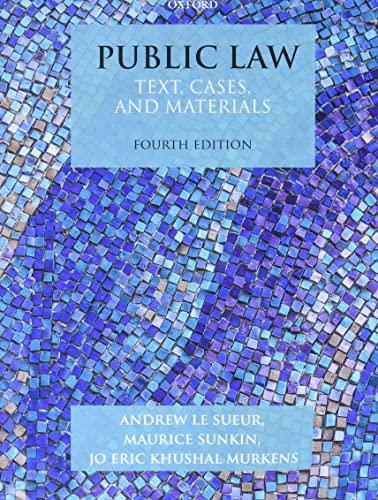Question
This page contains an edited summary of relevant portions of 'Review of the Equal Opportunity Act 1984 (WA): Project 111 Discussion Paper' published by the
This page contains an edited summary of relevant portions of 'Review of the Equal Opportunity Act 1984 (WA): Project 111 Discussion Paper'published by the Law Reform Commission of Western Australia in August 2021. The original Discussion Paper can be accessed online here
To prepare for tutorial discussion:
- Review the Week 9 Lecture - 'Law Reform Commissions'
- Read the 'call for submissions' on the next page (from Part 2 of the Discussion Paper- page 7)
- Select one or more of the questions from the box below - imagine you are making a submission to the Law Reform Enquiry on your chosen question(s):
- Open the relevant PDF link and read the short explanation in the relevant Issues Paper
- At the end of each Issues Paperthere is a page reference to the Discussion Paperfor further information. If you wish to view that information please access the Discussion Paperusing the link above and scroll to the relevant pages (note the numbers are document pages, not PDF pages)
- Write down some quick notes about what you would like to say in your submission, so that you are prepared to discuss it in tutorial. It's OK to say that you are undecided, as there will probably be other people who have a clear opinion - your job is to engage with the issue, and that can involve putting your view, listening to others, and responding to what others say.
Should the definition of 'impairment' be changed? PDF (124.48KB) https://www.wa.gov.au/system/files/2021-09/LRC-Project-111-Issues-Paper-01.pdf
Should the definition of 'gender identity' be changed? PDF (115.87KB) https://www.wa.gov.au/system/files/2021-09/LRC-Project-111-Issues-Paper-07.pdf
Should the Act prohibit discrimination against a person because they use an assistance or therapeutic animal? PDF (114.78KB) https://www.wa.gov.au/system/files/2021-09/LRC-Project-111-Issues-Paper-09_1.pdf
In tutorial we will also consider some or all of the following questions:
- Does the Commission consider all submissions, and do they give equal weight to them all?
- Could your submission be published without your consent, and would your name be included? What if you don't want that to happen?
- Do you need to speak from personal experience, or can you discuss the experience of others? Which of these types of submissions would be more useful to the Commission and why? What about submissions which are purely academic/theoretical, and don't refer to any particular experience?
- Have you ever made a submission to a Law Reform Commission enquiry in the past? Would you consider doing so in the future?
- How confident are you that this process is an effective way of achieving better laws, and do you think that the voices of ordinary people will really be taken into account?
THE 'CALL FOR SUBMISSIONS' INFORMATION APPEARS ON THE NEXT PAGE
Call for Submissions
The Commission welcomes submissions and responses to this Discussion Paper.
What is a submission?
Submissions are ideas or opinions about the law being reviewed. Submissions can be anything from a personal story about how a law has affected you, to a research paper complete with footnotes and bibliography. The Commission wants to hear from anyone who has experience with the Act or has an idea for change to Western Australia's anti-discrimination laws.
A number of questions are set out in the Discussion Paper to guide those wishing to make a submission. It is not necessary to respond to every question. The Commission encourages people to make a submission even if their experience or interest is confined to only a few of the issues or questions raised in the Discussion Paper. All submissions will be carefully considered.
What is a submission used for?
Submissions help the Commission understand different views and experiences about the law it is researching. Information in submissions, along with other research, is used to develop recommendations.
The Commission may seek to directly engage with some stakeholders prior to the finalisation of its recommendations in the final report.
How do I make a submission?
A submission can be made in several ways as detailed on the Commission's website. These include in writing via email or mail. There is no particular format you need to follow, however, it will assist the Commission if you address one or more of the questions listed in the Discussion Paper.
Confidentiality
Law reform is a public process. If you do not tell the Commission you want your submission treated confidentially or that you wish your comments to be anonymous, it will treat it as public. The Commission may quote from public submissions or refer to comments in whole or in part and may attribute them to you.
The Commission is subject to the Freedom of Information Act 1992 (WA)
Step by Step Solution
There are 3 Steps involved in it
Step: 1

Get Instant Access to Expert-Tailored Solutions
See step-by-step solutions with expert insights and AI powered tools for academic success
Step: 2

Step: 3

Ace Your Homework with AI
Get the answers you need in no time with our AI-driven, step-by-step assistance
Get Started


